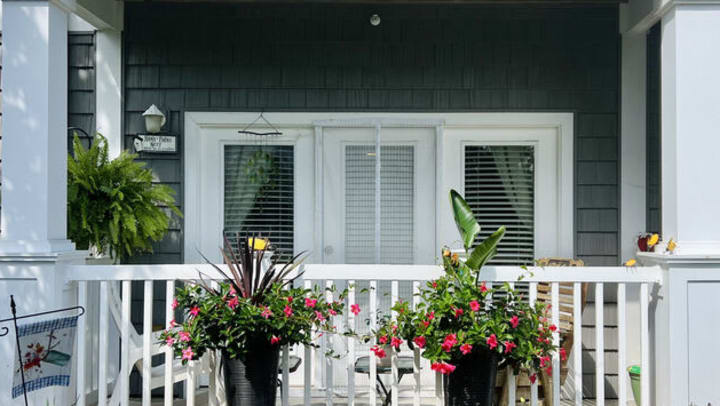Container gardening is the perfect solution for renters who want to create beautiful outdoor spaces, but don’t have acres of land. The Apartments at Spence Crossing all have outdoor balconies, which is a great place to start growing your own garden and dress up your balcony. Even if you don’t think you have a green thumb, we can give you some tips that will help your plants thrive and keep your balcony looking beautiful.
The Apartments at Spence Crossing in Virginia Beach are located in USDA Hardiness zone 8a, which means that any perennial plants you invest in should be rated for that climate. One of the biggest challenges might be finding adequate light, so be sure to check the light requirements for the plants you select. If your apartment gets some morning sun but spends the rest of the day in the shade, look for shade-loving plants. Conversely, if your balcony gets lots of direct sunlight, you’re going to look for plants labeled “full sun.” One good thing to know is that plants at the garden center are usually grouped according to their needs, so shade-loving plants will be displayed next to other shade plants, and vice-versa.
Before you select any plants, think about your containers. Plastic pots are inexpensive, and come in a variety of colors and sizes. Terra cotta pots are great because the clay “breathes” and helps plants regulate moisture. Glazed ceramic pots are usually the most pricey, and can come in a variety of sizes, colors and patterns. Choose a color scheme for your pots and consider a variety of heights and sizes. Whichever style you choose, make sure your pots have drainage so that you avoid root rot.
Just like arranging flowers, odd numbers generally look better than even numbers. Cluster three pots to liven up a corner of your balcony, or get a large planter and create an arrangement with 3-5 plants. When creating a mixed container, consider choosing “a thriller, a filler, and a spiller.” A “thriller” is a plant that stands out–in size, color, or both. A “spiller” is something that trails over the edge of your planter; usually a vining plant. And “filler” is a plant that’s full-bodied, filling in any negative space in the arrangement. We only ask that our residents avoid any permanent fixtures on their patios, so be mindful when selecting pots or planters that hang from the balcony railing.
Tips:
Perennial plants will die back in the cold months and sprout again in the spring. Annual plants will die at the end of the season. Evergreen plants look good year round, and some may provide colorful blossoms in spring/summer!
Fill your containers with potting soil rather than topsoil. Potting soil is intended to retain moisture.
Container plants dry out faster than plants in the ground. Water daily, or sometimes twice a day if it’s especially hot outside.
Fertilize regularly. Plants in containers will consume all the nutrients in their soil after a couple months, so a monthly supplement of liquid or granular fertilizer will help them stay happy.
Check your plant’s label to see how large it will be when it matures. You don’t want something that will outgrow your patio before the season ends!
Houseplants generally thrive outdoors in the summer time, presuming they don’t get too much sun and you increase your watering schedule to prevent them from drying out.
Shade/Part Sun Plants:
HostaCoral Bells
Caladium
Coleus
Moneywort
Creeping Jenny
Ferns
Full/Part Sun Plants:
Lantana
Petunia
Begonia
Verbena
Foxglove
Peony
Day lily
English Ivy
Ornamental grasses
Adding plants to your environment elevates your decor and creates a personal touch to your home. If you’re ready to see yourself in a luxury rental apartment at Spence Crossing in Virginia Beach, contact us today!

